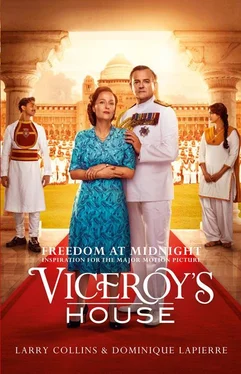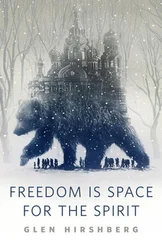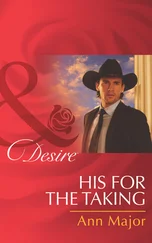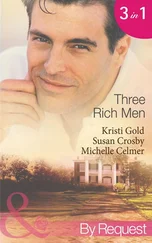India and Pakistan’s political leaders – Nehru, Patel, Jinnah and Liaquat Ali Khan – urged Mountbatten with one voice to transfer power to their hands just as swiftly as possible. Those men had been agitating and preparing for the exercise of power for years. Nothing was going to delay them in getting their hands on that power. Whatever their innermost thoughts may have been, all of them minimized in their recorded conversations with Mountbatten the dangers of the coming Partition of India and vastly overstated their abilities to deal with any troubles which might break out. Only one voice foresaw the dimensions of the tragedy which was about to overwhelm the sub-continent. That was Gandhi’s, and no one in mid-summer 1947 was listening to the prophet of non-violence.
‘What went wrong’, Mountbatten admitted to us, ‘was this sheer, simultaneous reaction which nobody foresaw. No one predicted millions of people would pull up stakes and change sides. No one.’
What, we asked him, would he have done differently had some authoritative voice made such a prediction?
‘I wouldn’t have done anything differently’ was his reply. ‘I couldn’t have. I would have got the leaders together and said: “We’re faced with this problem. What are we going to do?” I could have told them “We won’t transfer power” but that they would never have accepted.’
Some suggest with the benefit of hindsight that Mountbatten, acting in concert with the leaders of the two new dominions, should have held up the publication of Sir Cyril Radcliffe’s boundary awards. That, they argue, would have fixed those migrating millions into place, at least temporarily. Perhaps. Or would the uncertainty have fuelled the already explosive situation and led to even more violence?
There was one vital piece of knowledge denied to Mountbatten in the summer of 1947 which we uncovered during our work. This was the fact that Jinnah was dying of TB and had been told by his doctors with whom we spoke that he had less than six months to live. Had he known that, Mountbatten acknowledged, he would very probably have acted quite differently in India. Jinnah was the one overwhelming roadblock in his attempts to keep India united. Knowing Jinnah was dying, Mountbatten would have been sorely tempted, he admitted, to await his death. Then, perhaps, an independent Pakistan would never have come into being.
As far as the accusation is concerned that he moved too fast, that he rushed India and Pakistan into independence, it must be remembered that a swift transfer of power was part of the brief Mountbatten was given by Clement Attlee when he was appointed Viceroy in January 1947. Both men knew that British power in India had become by that time a hollow shell. The proud Indian Civil Service had been allowed to run down during the war. The soldiers of England’s conscript army in India were no more anxious to die to keep India British than Russian conscripts have been to die to keep Chechnya Russian. Mountbatten was haunted by the spectre of Direct Action Day staged in Calcutta in July 1946 by the Moslem League in which 26,000 Hindus were killed in 72 hours. Another challenge to British authority like that would have exposed just how weak England’s power structure had become in 1947. Mountbatten’s first concern, therefore, was to see that the responsibility for administering and policing India was transferred to Indian hands as quickly as possible. It was a nationalistically determined ordering of his priorities, but it was also the one assigned to him by the men who sent him to India.
One phrase in Chapter 13, entitled ‘Our People Have Gone Mad’, incensed a great number of our Indian readers and merits, perhaps, some comment from us here. It was Lord Mountbatten’s description of Nehru’s and Patel’s appearance when he met them in the study of his residence on Saturday 6 September 1947 on his return from Simla when the worst of the post-Partition violence was shaking India. The two leaders, he said, ‘looked like a pair of chastened school-boys’.
One can certainly say that, at the very least, his was an insensitive turn of phrase. The fact is, however, that Mountbatten did employ exactly those words in talking to us on tape. A week later in a subsequent interview he employed a similar phrase to describe the scene. The two men ‘were like schoolboys, absolutely pole-axed. They didn’t know what had hit them.’
The last Viceroy read the manuscript of Freedom at Midnight before its publication and made no reference to that phrase. Nor did he ask us to remove it following so many criticisms of its use by Indian readers. Was it up to us as the authors to censor his words, however injudicious they might have seemed? We thought not at the time of the book’s first publication and we feel the same way in regard to this new edition.
In the years which followed the original publication of Freedom at Midnight , both of us remained close to Lord Mountbatten. He took great delight in the book’s success, offering copies to Her Majesty the Queen, Prince Charles, for whom he had a special affection, and Prime Minister Harold Wilson, insisting each put aside other concerns to turn their attention to the text.
Mountbatten’s personal archives at his Broadlands Estate contained in well-organized, fireproof cabinets virtually every piece of paper bearing on his life, from the invitation cards to his christening to the menu of the last state dinner he had attended. He intended to use those archives as the foundation upon which some future author might construct his biography, sharing its royalty earnings with his grandchildren. In the years we worked together, he scoffed at the notion of designating his biographer. To do so, he said, would be like consigning himself to the grave. To our surprise, then, he announced to us about a year before his death in that mock imperious tone he sometimes employed, ‘I have decided that it is you two who will write my biography.’
‘Lord Louis,’ we protested, ‘you are one of the century’s most important Englishmen. This country’s establishment would consider it almost an act of treason on your part to entrust your biography to an American and a Frenchman.’
Mountbatten harrumphed, declaring our reply revealed how little either of us understood about the English establishment, an institution for which he, in any event, had a very limited regard. A few months later he returned to the topic. His son-in-law, Lord John Brabourne, the trustee of his archives, agreed, he told us, with our judgement. Relieved, we suggested he might want to consider Hugh Thomas, then the Regius Professor of History at Oxford, but it was clear his thinking on the question was veering back towards his earlier sentiments. Mountbatten died without having settled the question. The task of selecting his official biographer fell, therefore, to his son-in-law, who chose Philip Ziegler, the editor of Freedom at Midnight , for the task.
Although few people were aware of it, Mountbatten suffered from a series of minor cardio-vascular problems in the closing years of his life. His daughters and his doctor urged him to lighten his schedule and temper his zest for work. Rarely has well-intended advice fallen on deafer ears.
On occasion in our chats in those years in his Kinnerton Street flat in London, the conversation would turn to the subject of death. Gandhi’s death in particular fascinated him because, he maintained, the Mahatma had achieved in death what he had been striving to achieve in life, an end to India’s communal violence. That gave a dimension and meaning to his death which destiny accords to few humans. Without ever saying so explicitly, he implied that such an end was one he devoutly wished for, one which he would consider a fitting final chapter to his life.
Читать дальше












